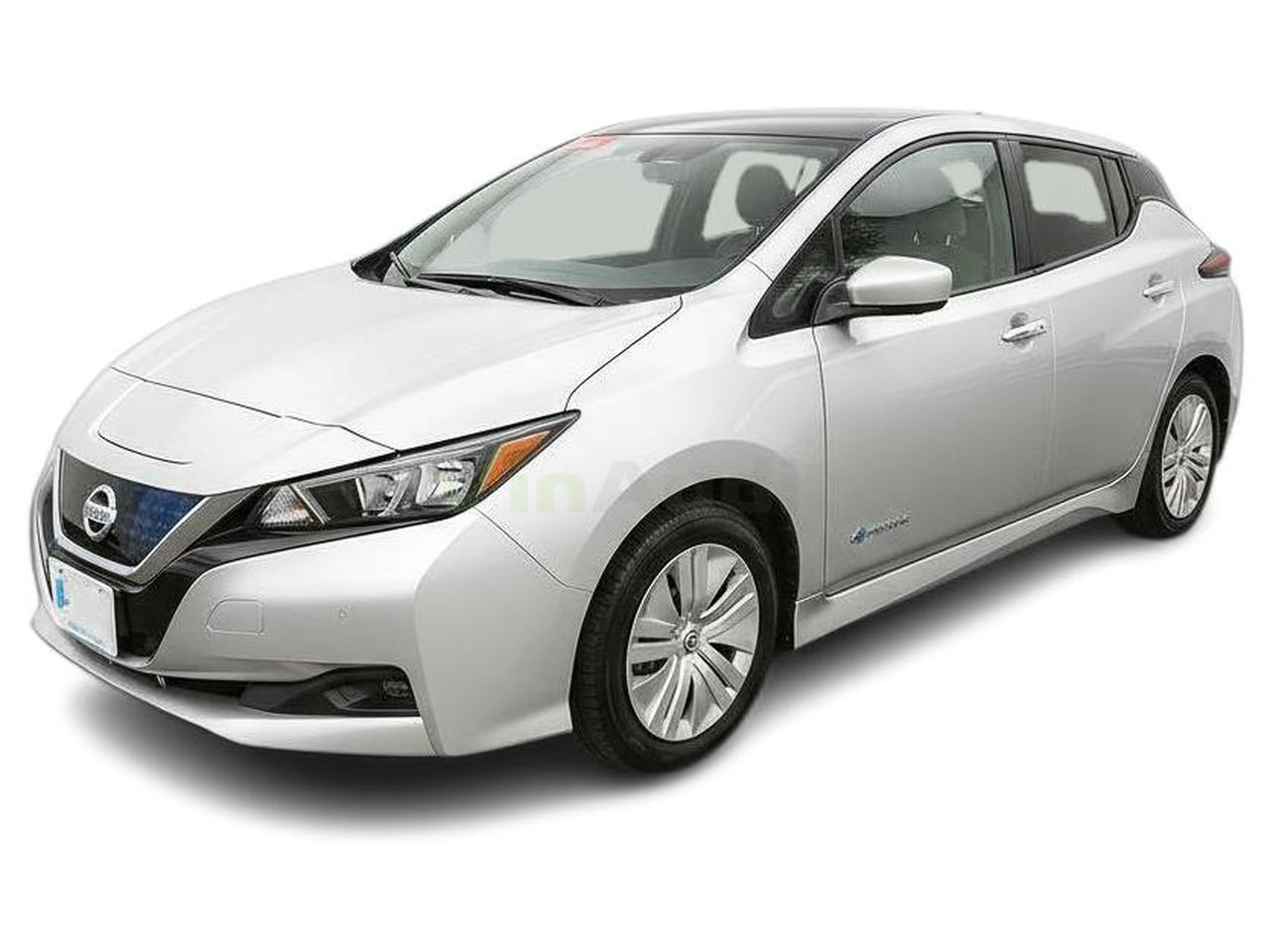The Good
The 2021 LEAF offers instant torque, providing surprisingly peppy acceleration, which appeals to those seeking a fun driving experience. It boasts a comfortable ride and a relatively spacious interior. From a practical standpoint, it's efficient and cost-effective to run, with lower "fuel" and maintenance costs compared to gasoline cars. Its established reliability in the EV segment provides peace of mind.
The Bad
The 2021 LEAF's range, especially in the base model, is a notable weakness compared to newer EVs. The battery cooling system isn't as sophisticated as some rivals, potentially leading to faster degradation in hot climates. The interior design can feel dated, and the regenerative braking system might not be as aggressive as some drivers prefer. Watch out for battery health reports when purchasing used.
2021 Nissan LEAF: Quick Overview
- Engine Options: Two electric motor options are available. The standard motor produces 147 horsepower, while the LEAF Plus models offer a more powerful 214 horsepower motor.
- Horsepower: 147 hp (standard), 214 hp (Plus models)
- Fuel Economy: Rated in MPGe (miles per gallon equivalent). The standard LEAF achieves around 123 MPGe city/99 MPGe highway. The LEAF Plus models achieve approximately 118 MPGe city/97 MPGe highway. Actual figures vary based on driving conditions.
- 0-60 Times: The standard LEAF accelerates from 0 to 60 mph in around 7.4 seconds. The LEAF Plus achieves it in approximately 6.7 seconds.
- Towing Capacity: The Nissan LEAF is not rated for towing.
- Trim-Level Features:
- S: 8-inch touchscreen, Apple CarPlay and Android Auto, Automatic Emergency Braking, Blind Spot Warning, Rear Cross Traffic Alert.
- SV: Adds Navigation, Adaptive Cruise Control, heated front seats and steering wheel, NissanConnect Services.
- SL: Includes leather upholstery, Bose audio system, Around View Monitor, ProPILOT Assist.
- S Plus: Longer range battery, more powerful motor, DC fast charging.
- SV Plus: Combines SV features with the Plus battery and motor.
- SL Plus: Combines SL features with the Plus battery and motor.
2021 Nissan LEAF Specifications
Vehicle Information
| Year | 2021 |
| Make | Nissan |
| Model | LEAF |
| Trim | - |
| Style | Hatchback |
| Type | Hatchback |
| Category | Mid-Size Car |
Manufacturing Details
| Made In | United States |
| Manufacturing City | SMYRNA |
Dimensions
| Doors | 4-Door |
| Curb Weight | 1760.84 kg |
| Gross Vehicle Weight Rating | - |
| Overall Height | 155.96 cm |
| Overall Length | 448.06 cm |
| Overall Width | 179.07 cm |
| Wheelbase Length | 270 cm |
| Standard Seating | 5 |
Engine & Performance
| Engine | Electric |
| Engine Size | - |
| Engine Cylinders | - |
| Transmission | 1-Speed Automatic |
| Transmission Type | Automatic |
| Transmission Speeds | 1-Speed |
| Drivetrain | Front-Wheel Drive |
Additional Features
| Anti-Brake System | 4-Wheel ABS |
| Steering Type | Rack & Pinion |
Pricing
| Manufacturer Suggested Retail Price (MSRP) | $32,620 USD |
| Invoice Price | - |
| Delivery Charges | $950 USD |
Vehicle History Report
Specifications
History
Events
History Check
Check
Check
Check
Check
Listings
Recalls
Check
Analysis
What Problems Does the 2021 Nissan LEAF Have?
Recalls for the 2021 LEAF have been relatively limited, but it's important to check the NHTSA website for any updates. Long-term reliability concerns primarily revolve around the battery's longevity and potential replacement costs. The e-Pedal system, while innovative, can take some getting used to, and some drivers find it jerky. Some owners have experienced software glitches with the infotainment system, though these are usually minor. Potential buyers should inspect the car's charging port and ensure it's free from damage. Overall, the 2021 LEAF benefits from Nissan's experience with EVs, but careful inspection and attention to battery health are essential.
How long will the 2021 Nissan LEAF last?
What Technology & Safety Features are Included?
Standard driver-assistance features include Automatic Emergency Braking, Blind Spot Warning, Rear Cross Traffic Alert, and Lane Departure Warning. Optional features, particularly on higher trims, include ProPILOT Assist, which combines adaptive cruise control and lane keeping assist for semi-autonomous driving. Other available features include an Around View Monitor (360-degree camera system) and Intelligent Driver Alertness.
Safety features encompass a suite of airbags, Vehicle Dynamic Control (VDC), and Traction Control System (TCS).
The NHTSA (National Highway Traffic Safety Administration) awarded the 2021 Nissan LEAF a 5-star overall safety rating. The IIHS (Insurance Institute for Highway Safety) gave the LEAF good ratings in most crash tests, but specific ratings may vary. The LEAF's e-Pedal, allowing for one-pedal driving, is a unique tech feature, although it may not appeal to all drivers.
What Colors Options are Available?
Exterior Colors
Interior Colors
2021 Nissan LEAF Prices and Market Value
2021 Nissan LEAF Cost of Ownership
2021 Nissan LEAF Fuel Efficiency
2021 Nissan LEAF Safety Rating
NHTSA
2021 Nissan LEAF Warranty
Basic
Powertrain
Rust
2021 Nissan LEAF Insurance
reasonable repair costs.
How Does the 2021 Nissan LEAF Compare to Other Hatchback?
Alternatives to consider include the Chevrolet Bolt for better range and driving dynamics, the Hyundai Kona Electric for a stylish and efficient option, and the Kia Niro EV for a practical and well-rounded choice. The LEAF's strength is its affordability, especially on the used market, but buyers seeking longer range or more advanced features might prefer its rivals. A used Tesla Model 3 can be a strong alternative if budget allows.
Ranks #98 Hatchback
| 1 | 2023 Toyota Corolla Hatchback | (0.0★) |
| 2 | 2023 Honda Civic Type R | (1.0★) |
| 3 | 2023 BMW i4 | (0.0★) |
| 4 | 2022 Mercedes-Benz GLA-Class | (0.0★) |
| 5 | 2016 Ford Focus Electric | (0.0★) |
| 6 | 2023 Audi A7 | (0.0★) |
| 7 | 2023 Nissan LEAF | (0.0★) |
| 8 | 2022 Chevrolet Bolt EUV | (5.0★) |
| 9 | 2022 Hyundai Ioniq Plug-In Hybrid | (0.0★) |
| 10 | 2023 Jaguar I-PACE | (0.0★) |
| 11 | 2023 Tesla Model S | (5.0★) |
| 12 | 2022 Porsche Panamera | (0.0★) |
| 98 | 2021 Nissan LEAF | (0.0★) |

